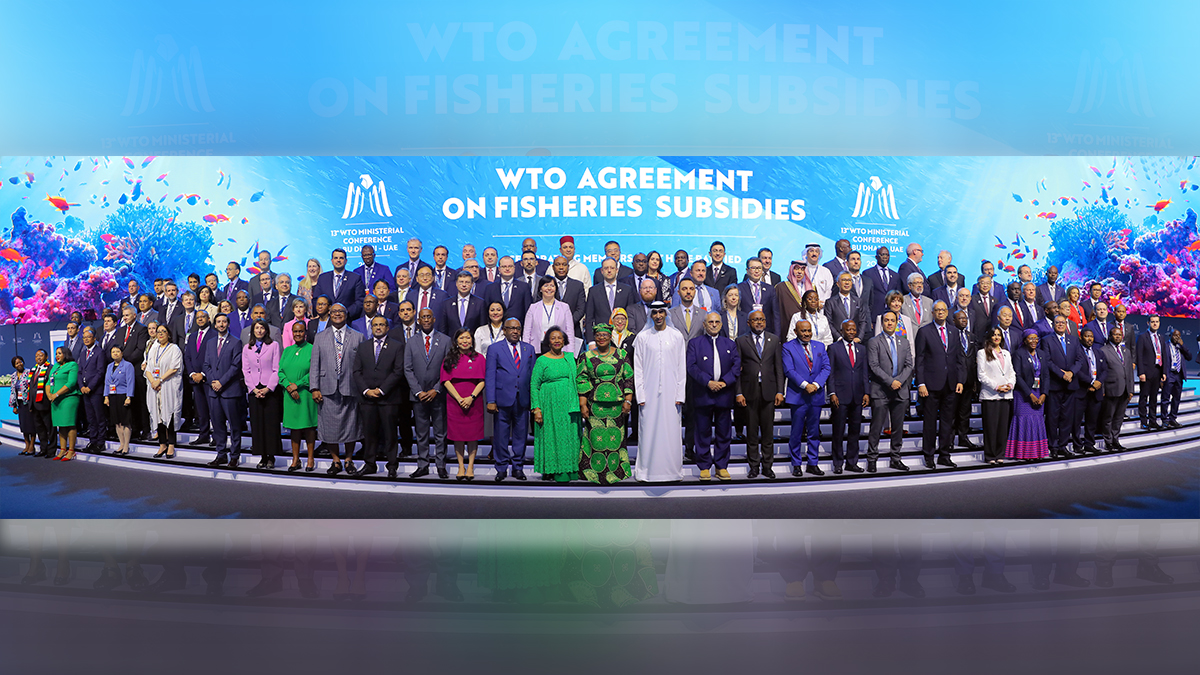
Abu Dhabi: Today, during the World Trade Organization (WTO) negotiation session on Fisheries Subsidies at the 13th WTO Ministerial Conference (MC13), India said any comprehensive agreement on Fisheries Subsidies should keep in mind the interests and welfare of the fishing community that depends on the marine resources for their livelihood and sustenance.
India reiterated its long-held position that responsible and sustainable fisheries were a practice ingrained in the ethos and practices of the country’s large and varied fishing community. It stressed that historically, while subsidies to the fisheries sector led to over-exploitation, subsidies were also vital for developing countries and small economies to develop and diversify their fisheries sector as well as to protect the food security and livelihood security of their fishermen.
“This negotiation is linked to the concept of sustainability and as such, any comprehensive agreement on fisheries subsidies should be built on the principles of Common But Differentiated Responsibilities and Respective Capabilities (CBDR- RC). It should also incorporate the provisions of Special and Differential Treatment (S&DT) appropriately, as is the case for all WTO agreements,” India stated.
At the same time, the Indian side noted that for such an agreement to be effective and forceful in advancing the sustainability objectives, there was an urgent case for capturing non-specific fuel subsidies and transferring fishing rights to corporate fishing under government-to-government (G2G) payments within the ambit of the disciplines. “Equally important is the need to discipline subsidies given by the Distant Water Fishing Nations as proposed by India,” it stated.
India urged the Members to introduce a moratorium on subsidies by Distant Water Fishing Nations for fishing or fishing-related activities beyond their exclusive economic zones (EEZs) for at least 25 years. India said that the Members should not lose sight of the harmful effects of subsidies for large-scale fishing on sustainable fishing and management of marine resources.
India further explained that the current approaches for addressing Over Capacity and Over Fishing (OCOF) were “deeply flawed”. Since the Members had agreed to use the affirmative determination approach for negotiating disciplines on the Overfished Pillar, there was no reason why the Members should not use the same approach in relation to the OCOF Pillar, India contended. In addition, it argued that the current approach of considering the annual aggregate value of subsidies grossly overlooked the intensity of subsidies, and other factors such as the size of the EEZ, the long coastal line, the population of small fishers and the per capita subsidies to fishermen.
India reiterated that the sovereign rights of Members for sustainable management of fisheries within their EEZs as provided under the UNCLOS should be duly recognized and protected.
The number of acceptances of the Fisheries Subsidies Agreement will reach 70 this week during MC13 but there are still 40 members to go, WTO Director-General Okonjo-Iweala said.
Earlier, the 13th WTO Ministerial Conference (MC13) opened in Abu Dhabi on February 26, 2024, with a call to WTO members to seize the full potential of the multilateral trading system so that it delivers for the people it serves, accelerating the green transition and fostering socio-economic inclusion around the world.
On the opening day, eight WTO members deposited their instruments of acceptance of the Agreement on Fisheries Subsidies on 26 February at the opening of the 13th Ministerial Conference (MC13). Ministers of Brunei Darussalam, Chad, Malaysia, Norway, Rwanda, Saudi Arabia, Togo, and Türkiye presented their instruments of acceptance to Director-General Ngozi Okonjo-Iweala.
Adopted by consensus at the WTO’s 12th Ministerial Conference (MC12), held in Geneva on 12-17 June 2022, the Agreement on Fisheries Subsidies sets new, binding, multilateral rules to curb harmful subsidies, which are a key factor in the widespread depletion of the world’s fish stocks. In addition, the Agreement recognizes the needs of developing and least-developed countries and establishes a fund to provide technical assistance and capacity building to help them implement the obligations.
The Agreement prohibits support for illegal, unreported and unregulated (IUU) fishing, bans support for fishing overfished stocks and ends subsidies for fishing on the unregulated high seas.
DG Okonjo-Iweala said: “Completion of ‘Fish 2’ and its rapid entry into force would really put WTO members at the forefront of action on sustainability of our oceans and would safeguard the livelihoods of the 260 million people who depend on these oceans. Ending the estimated $22 billion per year in harmful fisheries subsidies would free up resources that subsidisers can repurpose, whether to help people domestically or to help the wider world, such as through green financing for poor countries, or support for climate-related loss and damage.”
WTO welcomed its first new members in almost eight years: Timor-Leste and Comoros at MC13. Ministers formally approved the WTO membership terms of Comoros and Timor-Leste at a special ceremony on the opening day, yesterday. Both countries are least-developed countries (LDCs) and they bring the WTO to 166 members. Twenty-two more countries are seeking to follow in their footsteps including a sizeable contingent from the Arab world. “The opportunities they see in WTO membership, and their commitment to the demanding accession process, stand as an answer to anyone who questions the value that the WTO provides,” Okonjo-Iweala said in her opening remarks.
At MC13, two deliberative sessions have been planned for ministers. “This is something new that we are trying for the first time and we very much view this as part of WTO reform,” Okonjo-Iweala said. One of these sessions is on trade and sustainable development in all its dimensions – social, environmental, and economic. With respect to the economic dimension, issues of industrial policy and policy space will be important. The second session is on trade and inclusion. These sessions are intended to provide space for Ministers to engage on issues at the centre of contemporary economic debate and the intersections with the future of trade policy.
– global bihari bureau





